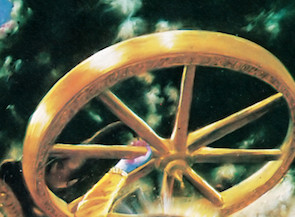Yes ! is the short (and fast) answer to the question raised by Damodar Padi here, which prompted this article.
The philosophical answer is, “the more things change, the more they remain the same”. I am writing more assuming that we are interested in ‘Thinking Slow’ answers along with ‘Thinking Fast’ ones.
The long (and slow) answer, for those who have an appetite for it, is “Highly unlikely”. As unlikely, as for a man who has lived in a house for the good part of his life, to build a new house completely from scratch.
Think of the psychometric score as a reflection of your worldview. And this worldview is not in the sense of a stray belief or about one aspect of your life.
This is a combination of the view, interpretations, conclusions, beliefs and responses that you have formed very early in your life. Experts call it ‘non-cognitive. It could even be pre-verbal. Enmeshed and complex. In that sense, the score is a verbal map of that non-articulated meta-meta worldview.
A house is far more than the sum of its bricks and mortar. Usually, there is one that is so much more than a house… it is home. This meta-meta world view is also more than just beliefs. And the home of your core.
Old houses are left for new ones. Many girls in India leave them for another house, boys leave them for a career, and IT folks for an onsite assignment! A person’s personality preferences may change like that. Due to career demands or aspirations. But does that new house ever become home? or the call to go back home comes gushing in the form of the mid-life, mid-career crisis?
People move out of a house at the first sign of un-liveability. A very good motivator…though we see more people living in unliveable houses, well past what they need to.
Rarest of rare people end up going to a new house out of awareness. And are able to make it their home.
Houses sometimes collapse. Due to an earthquake. Or war. Bad construction. Bad foundation. The owner of the house may unwittingly end up building a new house from the foundation up, even on a new plot.

When a lawyer is thrown out of a first-class compartment. It does not shake some stray belief but the entire construct around who he is, or what the world is,…the entire meta-meta world view comes crashing down as he dusts his expensive suit and watches the train leaving without him.
A bubbly, enthusiastic girl, interested in everything under the sun transforms after being mistreated by her lover. She becomes introverted and task-oriented. Though someone else comes back to hold her hand and take her back to ‘life’, does she ever exhibit the same exuberance, as often as she did before? We can guess a reasonable amount of confidence and confirm ‘when we met’ her!
‘Crucibles’, if you may!
When the violent revolutionary spends 27 years behind bars, or a scholar gets unjustly arrested in a communist country, it becomes a reason to change fundamentally. Or go back to something which is even more fundamental, their real home.
Technical point: Changing non-cognitive construct through cognition, is like evolution. Slow and persistent keeps reducing the intensity, duration, frequency of going back to old home.
As Naveen (Q4 Select), the source of half of the things in this post, would say, “in awareness, there is no personality type or preference”…but it would pop up under stress or frustration. The original question is akin to asking, “does a man surpass the fight/flight response?” Yes, but only until the next threat arrives.
One may change a house, but does one find a home there? You may be living in a house for many many years, but when you dream, you always find yourself in a particular house. You may exhibit a new personality preference for years, but something stresses you out and you fall back to that original one. Even if for a brief ‘non-cognitive moment, you fall back. As if, you never moved.

I am sure a lot of people saw the core personality preference in teacher-charioteer. Though he had vowed not to pick up the arms, under utter frustration he was ready to end the war with just the wheel of the chariot. No coincidence that this happens only when all his teachings of ‘swadharma’ one’s innate nature, personality – preferences, yield no result.
Let us conclude this post with two more beautiful questions in addition to the original one: 1. In our context – the modern workplace, how can these personality types be useful? 2. If they show a change over a period of time, what can it mean?
We will find greater insights for ourselves.
(related articles on the subject here and here)

